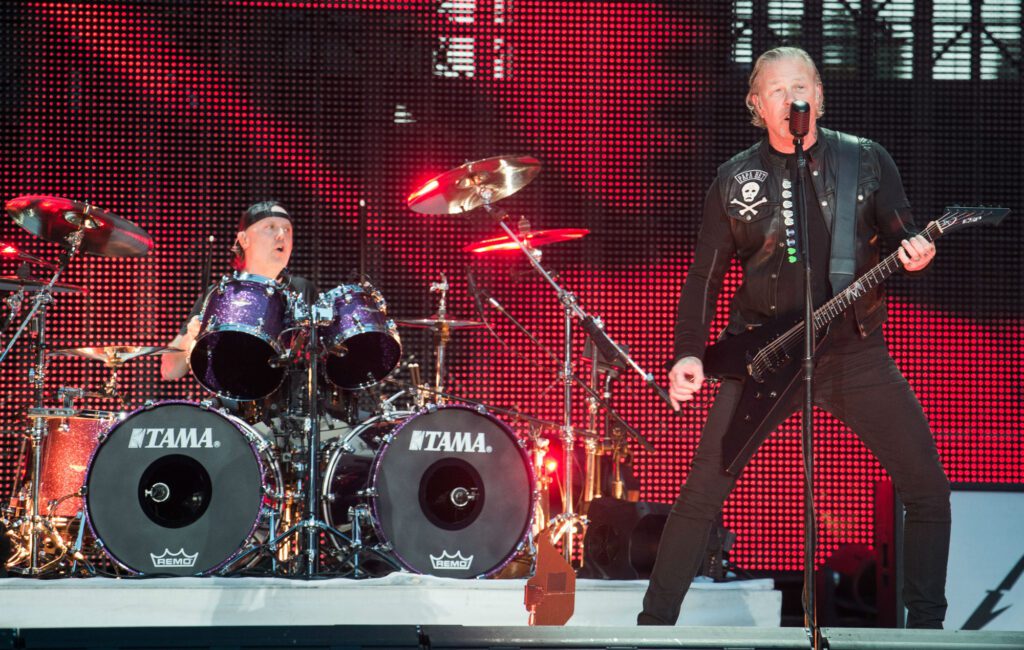Lars Ulrich talks creativity in lockdown and new Metallica material | NME
“Obviously it’s been a surreal five months and it’s been devastating for the whole world,” Metallica drummer Lars Ulrich tells NME, understatedly summarising the dumpster year of 2020 so far. “We’ve been trying to find new ways to continue to connect and communicate and make a difference with our fans and whoever else is interested. Five months later, we’re sort of in uncharted territory, but we’re always game for trying new things and looking at new opportunities and challenging ourselves to connect with our fans.”
From full-album team-ups with the late art-rock legend Lou Reed [‘Lulu’] to merging the genres of metal and classical with 1999’s ‘S&M’ album, the metal pioneers are used to pulling off not just the unexpected, but things that some might think are irreconcilable or impossible. During the pandemic, they’ve kept fans engaged with their streaming from-the-vaults concert series #MetallicaMondays, and recently filmed their first show of 2020 to an empty venue as part of the ‘Encore Drive-In Nights’ series, to be shown at hundreds of drive-in and outdoor theatres across the United States.
Added to that, they’ve also just released the album and film ‘S&M2’ – which documents the two epic concerts that reunited the band and San Francisco Symphony for the first time in 20 years, and features orchestral-backed Metallica classic songs mixed with full-on classical numbers, as well as an emotional tribute to late bassist Cliff Burton.
After his impressive performance in Does Rock N’ Roll Kill Braincells, Ulrich sat with NME for a quick chat about socially-distanced gigs, when to expect new Metallica material, and whether he was ahead of curve with his 2000 legal battle against Napster.
When the original ‘S&M’ happened in 1999, it must have felt like a gamble. Did doing the sequel 20 years later feel different?
Lars: “Well, it’s origin is in a different place because this time around there was a new arena opening in San Francisco, which was exciting. They asked us to be the first event to kick off the new building, which was an honour. Rather than make it about Metallica, we wanted to make it a celebration of the city, so the idea came up to ask the San Francisco Symphony to join us because we realised it was the 20th anniversary of the first ‘S&M’. It started off with ‘Let’s celebrate San Francisco’ and then it became an album and a movie when we realised what we had was different enough than what we did the first time around in 1999. The record was supposed to come out four months ago – in the middle of the worst of the pandemic – but the production plants were shut down, so it’s coming out late.”
Metallica seem to adapted admirably well to the age of COVID. What was it like playing your first big gig together to be shown in drive-ins across the US?
“I mean, it’s pretty clear now compared to April that we’ll be sitting here for a while and obviously we’re not going to return to ‘normal’, and so we’re going to have to adapt to new ways. Nobody knows when that’s going to end or what it’s going to settle upon, but this drive-in opportunity is certainly an experiment and it’s fun to get the band back together. Obviously COVID restrictions, face-masks, shields, having tests every other day and setting up a bubble and having everybody quarantined are all practicalities that put a certain pressure on everybody, but at the same time, everybody – the crew, the band members – stood up to the challenge and made it happen.”
What have you made of non-socially distanced rock shows? Did you see the Smash Mouth gig that went ahead recently?
“I did see that. But listen, everybody in my circle takes safety seriously. Listen, at my age, I don’t want this disease and have to find out what it does to my lungs on the other side, so I’m going to take care of myself and everybody else in my family. Everybody else in Metallica feels the same way. But I’m not going to judge or comment on what other people do – all I know is that wearing a face-mask is not only a pleasure, it’s a privilege, and so it’s something I do loud and proud. It’s the responsible thing to do if you care about the people around you.”
Metallica have been writing together via Zoom. Have you found this lockdown period creatively productive?
“I’m not sure – it’s not easy, but we’ve been doing what we can. We’ve been exchanging ideas back and forth. The hardest thing about being in four different spaces is that there’s no software that can have us all play in real time to reach other. So I can play something and send it to the next guy and then he can play on it and he can send it to the next guy, or vice-versa, but we can’t play at the same time so it takes the impulsivity and the momentary energy out of the occasion.”
“I’ve talked to some people in technology about how close we are to being able to all play in real time with each other, but that hasn’t been cracked yet. If it is, we’ll maximise it, but for now, we’re in this bubble for a couple of weeks, and we’re looking forward to seeing if at some point this fall, we can get back into another bubble where we write and play and maybe even record – so we’re looking forward to the possibilities on that one.”

When can we expect new Metallica music?
“Not soon enough! Right now, I’d say the hardest thing about all this is trying to plan, because five minutes later, those plans change – that’s just the nature of the state of the world at the moment and we’re going to have to accept and surrender to it. I think it’s a good reminder of the fragility of the world and how maybe we should occasionally pause and be a little bit more respectful and appreciative of what we have and understand how quickly it can derail in terms of how we arrogantly expect everything to be way we wanted as a human race.”
Given Spotify boss Daniel Ek’s recent comments that artists “can’t record music every three or four years and think that’s going to be enough”, do you feel vindicated in your battle against Napster 20 years ago?
“I’m not sure I can answer that in 90 seconds! First of all, I’m not seeing a lot of people at the moment, so they haven’t exactly said ‘You were right’. I’m aware of what Daniel Ek said and he’s a good friend and I love Spotify, so I’m not going to say anything bad about that. I mean, Metallica lives in its own world, in our own bubble, and we’re very independent and just roll along how we like. Now I understand that’s an incredibly privileged position to be in, and we’re very grateful, but it’s difficult for me to put myself in the mind of being a 22-year-old singer-songwriter in LA.”
How do you feel now about music being free across the internet?
“What you’re asking is very big and complicated issue, but if you flip it on the positive, you could say the fact that you and I could make a record in the next week via Zoom, or we could send each other a bunch of ideas to play on, and I could put out our record on YouTube or Spotify or Apple Music or whatever. So I think sometimes the arguments are presented but sometimes the big picture is missing. As technology advances, you have to remember that 30 years ago, you and I couldn’t have made a record with the same ease that we could today. With new technologies, there’s an upside and a downside, and I think we always have to continue to weigh all of those together at the same time.”
Metallica’s ‘S&M2’ is out now.





